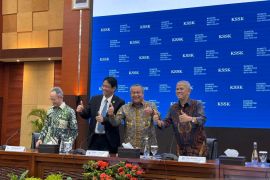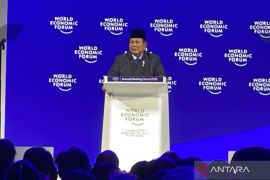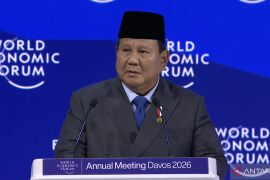The United States' economic growth has shown signs of moderation over lower incomes and receding business confidence, limited fiscal stimuli as the impact of the corporate tax cuts ebbs, and ongoing structural labor market issues.
Facing a similar bleak scenario is China whose economic deceleration continues despite the authorities having applied an expansive fiscal policy through tax reductions and infrastructure development.
Poor export performance and unsolved financial sector issues in addition to the structural challenge posed by an aging population are weighing heavy on Europe's economic growth.
Economic growth has also failed to match up to expectations in Latin American and Middle Eastern countries. Correspondent with the global economic moderation, world trade volume, and international commodity prices are recording downward trends, as opposed to an oil price hike during the earlier period owing to geopolitical factors.
The global monetary policy response has failed to be as tight as earlier expected, thereby allaying global financial market uncertainty.
To this end, Bank Indonesia (BI) Monetary Management Department's Executive Director Nanang Hendarsah believes that the trend of the rupiah falling to a weak level against the US dollar, since the last two-week period in the least, is only transitory in nature owing to the global financial market uncertainty.
The pressure on the rupiah was inevitable after the greenback continued to strengthen in recent weeks following various members of the Fed's Central Bank Committee harboring differing views while addressing the rate of economic growth and US inflation.
Hendarsah pointed out that US President Donald Trump's recent statement regarding a trade war with China had also fueled the uncertainty.
Hendarsah made the statement in the context of Trump's ultimatum to apply a 25 percent hike in US import duties targeting several Chinese products worth US$200 billion.
Trump's statement has also put off-market players, who in the earlier few weeks, had their hopes up high over a milestone agreement being reached on road to trade peace between the duo economic giants of the world.
"This has driven down the volatile yuan, while shares in China also wallowed low, with a drop of five percent," he noted.
Nonetheless, Hendarsah pointed to the robust national economic growth of 5.07 percent year-on-year (yoy) in the first quarter of 2019, hinting at sustained domestic economic performance in spite of retreating from 5.18 percent yoy in the fourth quarter of 2018.
Seasonal factors at the start of the year coupled with the effect of below-expected global economic gains have resulted in moderate economic downturn in Indonesia, he stated.
Economic growth in the first quarter of 2019 was chiefly encouraged by domestic demand on the back of consumption by non-profit institutions serving households (NPISH) and households.
He remarked that NPISH consumption growth expedited to 16.93 percent yoy during the reporting period, from 10.79 percent yoy in the three months up to December 2018, supported by spending on preparations for the 2019 General Election.
Household consumption also stayed high owing to controlled inflation, rising incomes, and increasing consumer confidence, despite slight moderation, from 5.08 percent yoy to 5.01 percent yoy in the first quarter of 2019, he pointed out.
Moreover, domestic demand was backed by strong building investment. Net exports maintained a positive trend with a decline in imports, though exports also softened in tune with global economic moderation and sliding global commodity prices.
BI is cognizant of positive national economic performance against the backdrop of weaker-than-expected global economic dynamics, he noted.
Forging ahead, BI will maintain a pro-growth policy mix focused on maintaining macroeconomic stability.
Moreover, the policy mix, instituted by BI, the government, and other relevant authorities, will consistently be strengthened for maintaining the momentum of economic growth. As a result, BI has forecast economic growth for 2019 to lie in the range of 5 to 5.4 percent.
The Central Bureau of Statistics (BPS) had earlier noted that positive performance of household consumption had contributed to Indonesia's economic growth in the first quarter (Q1) of 2019 at 5.07 percent.
"Household consumption expenditure recorded a positive growth, chiefly in health and education spending, as well as in the area of food and beverage, apart from restaurants," Suhariyanto, the BPS chairman, stated.
Household consumption growth in Q1 of 2019 was measured at 5.01 percent, or rising from 4.94 percent in Q1 of 2018 and Q1 of 2017 respectively.
Retail sales posted an 8.1 percent growth, especially from food and beverage as well as household equipment, being the contributors to domestic consumption.
Meanwhile, the Indonesian Employers Association (Apindo) was upbeat that Indonesia's economy would register an over six percent growth in 2020 owing to the comprehensive efforts of all stakeholders.
"We are optimistic of the economy growing by over six percent in 2020," Apindo Chairman Hariyadi Sukamdani remarked.
Citing the examples of some developing nations successfully transforming to developed ones and driving their economic growth by notably raising national production, Sukamdani believes that optimal handling of labor issues and stepping up the output of national production can drive the national economy.
Speaking in connection with concerns arising over the demand for national products, he expressed optimism that domestic and foreign markets would fully absorb the national production output, as was observed in China.
Apindo further put the spotlight on other issues that presently pose hurdles in the path of national economic growth, including far from optimal absorption of the labor force.
Total labor reforms are deemed necessary in the near future to boost national production output that can ultimately drive the economy, Sukamdani stated.
Related news: Processing industry props up economic growth in Q1 2019: BPS
Related news: Nasution points to 2019 first-quarter growth pattern resembling 2018
Related news: First-quarter economic growth driven by household consumption
Editor: Azizah Fitriyanti
Copyright © ANTARA 2019












